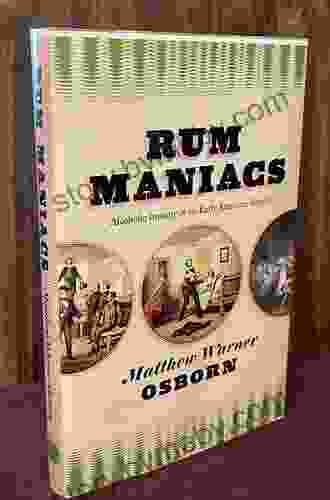Alcoholic Insanity In The Early American Republic

The Perilous Grip of Intemperance
Alcoholism, a persistent scourge throughout human history, held a particularly insidious grip on the early American republic. In the formative years of the nation, excessive drinking permeated all levels of society, from the elite to the marginalized. This widespread intemperance wreaked havoc on countless lives, leaving a devastating trail of broken families, shattered livelihoods, and fractured minds.
4.2 out of 5
| Language | : | English |
| File size | : | 9210 KB |
| Text-to-Speech | : | Enabled |
| Screen Reader | : | Supported |
| Enhanced typesetting | : | Enabled |
| Word Wise | : | Enabled |
| Print length | : | 277 pages |
| Lending | : | Enabled |
The term "alcoholic insanity" emerged to describe the severe mental and behavioral disturbances caused by alcohol abuse. Victims of this affliction exhibited a range of symptoms, from hallucinations and delusions to violent outbursts and cognitive impairments. In the absence of modern medical knowledge, alcoholic insanity was often mistaken for other mental conditions, leading to misdiagnosis and ineffective treatment.
The Drunken Society
Alcohol consumption was deeply ingrained in American culture during this period. For many, it was an indispensable part of daily life, a means of socialization, celebration, and relaxation. Hard cider, beer, and distilled spirits flowed freely at taverns, homes, and even religious gatherings. The acceptance of excessive drinking facilitated the rise of a "drunken society," where intoxication was tolerated, even celebrated, in certain contexts.
However, beneath the jovial surface lay a darker reality. Alcoholism took a heavy toll on the health, productivity, and morality of the nation. It fueled crime, violence, and social unrest, straining the young republic's fragile institutions. Recognizing the dire consequences of intemperance, concerned citizens began to mobilize, seeking ways to combat this pervasive societal menace.
The Temperance Movement: A Quest for Sobriety
The Temperance Movement emerged as a powerful force in the early 1800s, advocating for moderation and abstinence from alcohol. Driven by religious and moral convictions, temperance reformers sought to educate the public about the evils of alcohol and promote a healthier, more virtuous way of life.
Temperance societies sprang up across the country, organizing rallies, distributing literature, and lobbying for legislation to restrict alcohol sales and consumption. Their efforts bore fruit, leading to a gradual shift in public attitudes towards drinking. By the mid-19th century, temperance had become a dominant force in American society, influencing politics, social policies, and personal behaviors.
Understanding Alcoholic Insanity: Medical and Scientific Perspectives
As the medical understanding of alcohol-related disFree Downloads evolved, so did the perception of alcoholic insanity. In the early decades of the republic, mental health was poorly understood, and alcoholic insanity was often seen as a moral failing or a divine punishment. However, the development of psychiatry and the rise of scientific inquiry gradually shed light on the biological and psychological mechanisms underlying this condition.
Dr. Benjamin Rush, a prominent physician and social reformer, played a pivotal role in defining and treating alcoholic insanity. He recognized the physical and mental damage caused by excessive drinking and advocated for compassionate and evidence-based treatment approaches. Other medical professionals, such as Dr. William Sweetser, contributed to the understanding of alcohol's effects on the brain and the development of more specialized interventions for alcoholic insanity.
Treatment and Recovery in an Era of Limited Resources
Treatment options for alcoholic insanity in the early American republic were limited and often ineffective. Many individuals struggling with this condition were confined to almshouses or asylums, where they received little specialized care. Isolation and harsh punishments were common, further exacerbating the mental and emotional turmoil experienced by these patients.
The development of specialized asylums for alcoholics marked a gradual improvement in treatment conditions. These institutions provided a more structured and therapeutic environment, offering a range of services, including medical care, counseling, and occupational therapy. However, even these facilities faced challenges due to overcrowding, underfunding, and a lack of trained professionals.
The Legacy of Alcoholic Insanity: A Complex and Enduring Issue
The legacy of alcoholic insanity in the early American republic continues to reverberate in modern society. While the prevalence of excessive drinking has fluctuated over time, alcohol abuse remains a significant public health concern. The consequences of alcoholism, including mental health problems, social dysfunction, and economic burden, continue to impact individuals, families, and communities.
The historical experiences of alcoholic insanity offer valuable insights into the complex relationship between alcohol, mental health, and societal responses to substance abuse. By understanding the challenges and triumphs of the past, we can better address the ongoing issue of alcoholic insanity in the present and work towards a future where addiction is met with compassion, evidence-based treatment, and a commitment to recovery.
Alcoholic Insanity in the Early American Republic provides a fascinating and sobering look at the devastating impact of alcohol abuse on a society in its formative years. It is a story of human suffering, societal challenges, and the gradual emergence of a more compassionate and scientific approach to mental health. By exploring the historical roots of this condition, we gain invaluable knowledge that can inform our efforts to prevent and treat alcohol-related disFree Downloads today.
4.2 out of 5
| Language | : | English |
| File size | : | 9210 KB |
| Text-to-Speech | : | Enabled |
| Screen Reader | : | Supported |
| Enhanced typesetting | : | Enabled |
| Word Wise | : | Enabled |
| Print length | : | 277 pages |
| Lending | : | Enabled |
Do you want to contribute by writing guest posts on this blog?
Please contact us and send us a resume of previous articles that you have written.
 Book
Book Novel
Novel Page
Page Chapter
Chapter Text
Text Story
Story Genre
Genre Reader
Reader Library
Library Paperback
Paperback E-book
E-book Magazine
Magazine Newspaper
Newspaper Paragraph
Paragraph Sentence
Sentence Bookmark
Bookmark Shelf
Shelf Glossary
Glossary Bibliography
Bibliography Foreword
Foreword Preface
Preface Synopsis
Synopsis Annotation
Annotation Footnote
Footnote Manuscript
Manuscript Scroll
Scroll Codex
Codex Tome
Tome Bestseller
Bestseller Classics
Classics Library card
Library card Narrative
Narrative Biography
Biography Autobiography
Autobiography Memoir
Memoir Reference
Reference Encyclopedia
Encyclopedia Lorraine Mcconaghy
Lorraine Mcconaghy Tony Grice
Tony Grice Leon Katz
Leon Katz Rose Eichenbaum
Rose Eichenbaum Russ Rodgers
Russ Rodgers Linda Welters
Linda Welters Ronald Parker
Ronald Parker Mia Aim
Mia Aim Stefan Hofer
Stefan Hofer Iris Bolling
Iris Bolling Larry Bossidy
Larry Bossidy Matthew Bowling
Matthew Bowling Lawrence Goldstone
Lawrence Goldstone Lee Brian Schrager
Lee Brian Schrager Kyung Won Chung
Kyung Won Chung Stacey Steinberg
Stacey Steinberg Kjell Erik Rudestam
Kjell Erik Rudestam Krissy Moehl
Krissy Moehl Wolfgang Ziegler
Wolfgang Ziegler Krista Van Laan
Krista Van Laan
Light bulbAdvertise smarter! Our strategic ad space ensures maximum exposure. Reserve your spot today!
 Brenton CoxFollow ·6.1k
Brenton CoxFollow ·6.1k Jayson PowellFollow ·6.4k
Jayson PowellFollow ·6.4k Stanley BellFollow ·7.5k
Stanley BellFollow ·7.5k Billy PetersonFollow ·13.8k
Billy PetersonFollow ·13.8k Eugene PowellFollow ·5.6k
Eugene PowellFollow ·5.6k Harold BlairFollow ·11.4k
Harold BlairFollow ·11.4k Yukio MishimaFollow ·16.1k
Yukio MishimaFollow ·16.1k Pete BlairFollow ·5.3k
Pete BlairFollow ·5.3k

 Forrest Reed
Forrest ReedHockey Grit, Grind, Mind: The Ultimate Guide to Mental...
Hockey is a tough...

 Juan Rulfo
Juan RulfoUnlock Your Inner Artist: Embark on a Sketching Journey...
Embrace the Beauty of Nature Through Quick...

 Nathaniel Hawthorne
Nathaniel HawthorneSo You Think You're a Philadelphia Phillies Fan?
The Philadelphia Phillies are one of the most...

 Jeff Foster
Jeff FosterGoal-Based Investing: A Comprehensive Guide to Achieving...
Investing is not...

 Aleksandr Pushkin
Aleksandr PushkinGNOMEDOM: The Future Unfolds (Gnomedom Tales 1)
Escape into the enchanting world of Gnomedom...

 Branden Simmons
Branden SimmonsInternal Factors And Training Concepts For All Internal...
Internal arts, such as Tai...
4.2 out of 5
| Language | : | English |
| File size | : | 9210 KB |
| Text-to-Speech | : | Enabled |
| Screen Reader | : | Supported |
| Enhanced typesetting | : | Enabled |
| Word Wise | : | Enabled |
| Print length | : | 277 pages |
| Lending | : | Enabled |












